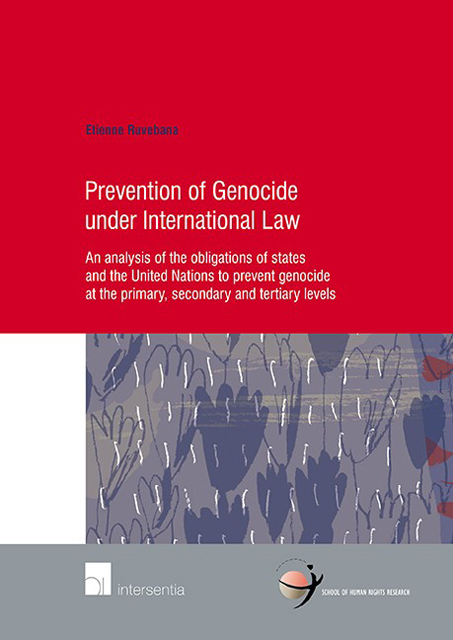 Prevention of Genocide Under International Law
Prevention of Genocide Under International Law Published online by Cambridge University Press: 24 November 2022
INTRODUCTION
This chapter aims at discussing the obligation to prevent genocide by territorial states in a concrete way: by looking at what they are required to do in preventing genocide on their territory. For the purpose of this work, a territorial state means any state as known in international law with powers and privileges recognized in international law within the boundaries of its borders. This chapter proceeds in four sections. It starts with briefl y examining the territorial scope of the obligation to prevent genocide as far as territorial states are concerned (section one). This will be followed by an analysis on what international law requires to territorial states to do in order to comply with their obligation to prevent genocide. This is done at three levels: primary (section two), secondary (section three) and tertiary (section four). Some challenges on prevention common to the three levels will be identified and suggestions to overcome them will be given (section 5). This is a longer-term and more comprehensive approach to prevent genocide and it is argued that it is only when prevention is done through these levels that the chances of its effectiveness become high.
TERRITORIAL SCOPE OF THE OBLIGATION TO PREVENT GENOCIDE
What is the legal basis for territorial states to prevent genocide on their territory? This is the question that will be briefl y treated in this section.
Article 29 of the Vienna Convention on the Law of Treaties states that “unless a different intention appears from the treaty or is otherwise established, a treaty is binding upon each party in respect of its entire territory”. Thus, from what is provided in article I of the Genocide Convention, each state has the primary obligation to prevent genocide from being committed to the population on its territory. This has been reiterated in literature. For instance, Sammaruga has written that the prevention of deadly conflicts (genocide being one of the worst of them) and other forms of man-made catastrophes are indeed first the responsibility of sovereign states and the communities and institutions within them. This means, as was also observed by Arbour, that States have a responsibility under existing international law vis-à-vis the people on their territory to prevent genocide.
To save this book to your Kindle, first ensure [email protected] is added to your Approved Personal Document E-mail List under your Personal Document Settings on the Manage Your Content and Devices page of your Amazon account. Then enter the ‘name’ part of your Kindle email address below. Find out more about saving to your Kindle.
Note you can select to save to either the @free.kindle.com or @kindle.com variations. ‘@free.kindle.com’ emails are free but can only be saved to your device when it is connected to wi-fi. ‘@kindle.com’ emails can be delivered even when you are not connected to wi-fi, but note that service fees apply.
Find out more about the Kindle Personal Document Service.
To save content items to your account, please confirm that you agree to abide by our usage policies. If this is the first time you use this feature, you will be asked to authorise Cambridge Core to connect with your account. Find out more about saving content to Dropbox.
To save content items to your account, please confirm that you agree to abide by our usage policies. If this is the first time you use this feature, you will be asked to authorise Cambridge Core to connect with your account. Find out more about saving content to Google Drive.